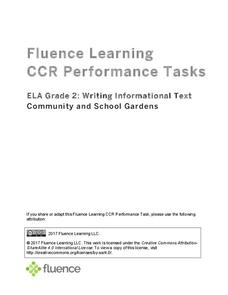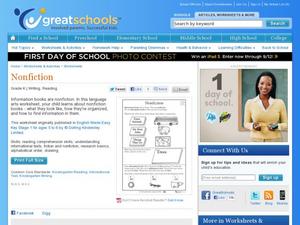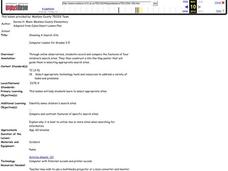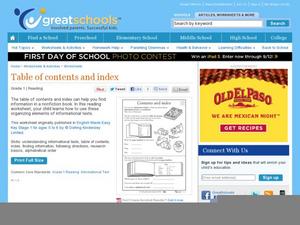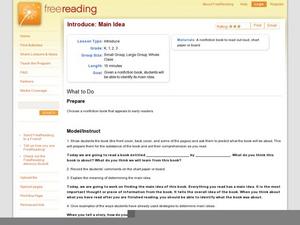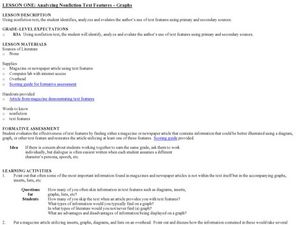Ontario
Reading Informational Text
Learning to recognize the importance of the features of information text (i.e., titles, subtitles, endnotes, sidebars, etc.) is the focus of a reading activity designed for middle schoolers. Learners examine how these text features help...
Fluence Learning
Writing Informational Text: Community and School Gardens
Two informational texts feature community gardens of the past and present and how seeds grow. Scholars read, discuss what they have read, complete a timeline, define words, and compose a brief essay about the texts' main idea.
Roseburg Public Schools
Library Skills and Literature
The library is such a valuable resource for kids of all ages. Help elementary readers learn all about parts of the library, text features for both fiction and nonfiction text, and different ways to find books that they want to read.
Curated OER
Nonfiction
As scholars begin using informational texts, it's important they understand their uses and features. This visual worksheet has readers match three text titles to corresponding pictures. Next, they examine a book cover with the...
Scholastic
Citing Text Evidence
Could you go without your cell phone for 48 hours? Pose this question to your class and then read the article provided here. Pupils mark the text and and complete a graphic organizer that requires the use of textual evidence.
Curated OER
Analyzing Nonfiction Text Elements - Editorials
Examine the text features of non-fiction. Start the lesson by reading editorial samples provided by their instructor and analyze the texts for word choice, details, and organization. An editorial example and graphic organizer are...
Curated OER
Choosing A Search Site
Computer savvy kids construct a lift-the-flap poster to aid them in selecting appropriate search sites for research and information gathering. Through online observations, they record and compare the features of four children's search...
Houghton Mifflin Harcourt
Alexander Graham Bell
Study the features of nonfiction text with a set of comprehension and analysis materials. Readers learn about Alexander Graham Bell with questions about the text, writing prompts, and proofreading activities.
Curated OER
Contents and Index
It's important for your readers to understand features of informational text such as index and table of contents, so give them this visual activity to get started. They read a brief explanation of informational text, then look at an...
Curated OER
Introduce Vocabulary: An Earthworm's Life (Himmelman)
Explore some tier-two vocabulary using John Himmelman's informational text An Earthworm's Life. Recommended words for this slimy text are: bulge, burrow, journey, soil, and underground. After introducing these words, help kids utilize...
Curated OER
Practice Book O
Whether you need resources for reading comprehension, literary analysis, phonics, vocabulary, or text features, an extensive packet of worksheets is sure to fit your needs. Based on a fifth-grade curriculum but applicable to any level of...
Curated OER
Introduce Vocabulary: Happy Birthday, Moon (Asch)
Can you wish the moon a happy birthday? Beginning readers contemplate this as they listen to Frank Asch's book Happy Birthday, Moon, the context for a vocabulary study. There are three words outlined here: chat, echo, and perfectly, but...
Curated OER
Introduce Vocabulary: Gregory, the Terrible Eater (Sharmat)
Help budding readers learn words like develop and revolting as they listen to you read Mitchell Sharmant's Gregory, the Terrible Eater. Get the new vocabulary rolling before reading it aloud so youngsters can raise a hand when they hear...
Curated OER
Synonyms and Antonyms
Mix up your writing lessons by having kids look at recent newspaper articles instead of their own work. They work in pairs and rewrite sports news articles using synonyms and antonyms for a set number of words. Then they share their work...
Curated OER
Dictionaries
Introduce your budding readers to the dictionary. They read a brief introduction on dictionary features, observing pictures and examples of one-syllable words they could find in a dictionary. Using the word list, they determine which...
Curated OER
Introduce: Main Idea
Begin exploring main idea in a text by telling the class an interesting story. Can they recall the main idea after you finish? What clues told them this was it? Explain that you will apply this concept as you read a nonfiction book....
Curated OER
Persuasive Arguments
Examine persuasive writing using this informational excerpt about natural habitat conservation. Readers examine the headings of three paragraphs to determine their effect, then copy the first sentences of each. They use these topic...
Scholastic
Comprehension During Independent Reading
Ideal for a language arts class, literary unit, or independent reading assignment, a set of reading worksheets address a wide array of skills. From poetic elements to nonfiction text features, you can surely find a valuable resource in...
Curated OER
Analyzing Non-Fiction Text Features- Graphs
Students examine the text features of non-fiction. For this literacy lesson, students practice reading graphs and discover the authors intent for using them in primary and secondary sources.
Curated OER
Analyzing Nonfiction Text Features - Graphs
Students examine the text features of non-fiction. In this literacy lesson plan, students practice reading graphs and discover the authors intent for using them in primary and secondary sources.
Ontario
Reading Graphic Text
Do students really need to be taught how to read cartoons, comic books, and comic strips? Yes. Just as they need to learn how to read other forms of graphic text such as diagrams, photos, timetables, maps, charts, and tables. Young...
EngageNY
Gathering Evidence and Drafting a Two-Voice Poem (Chapter 13: "Los Duraznos/Peaches")
Begin class with a short comprehension quiz and review and then move into a new genre: two-voice poems. The activity provides information about this type of poetry as well as a video example made by eighth graders that you can show your...
National Council of Teachers of English
Writing Acrostic Poems with Thematically Related Texts in the Content Areas
Scholars scour thematically aligned texts to gather a bank of words they can use in an original acrostic poem.
EngageNY
Writing to Inform: Analyzing a Model Using a Rubric
Learn to write right. Scholars analyze the model essay Adversity Faced by Townspeople in the Middle Ages. They discuss the essay and make annotations working with an elbow partner. Learners then take another look at the essay using a...



